Coronavirus Disease 2019
5 Ways COVID-19 Might Be Affecting Filipino Americans
Ethnic-specific data is rare, but here are some hypotheses for future research.
Posted April 15, 2020 Reviewed by Kaja Perina
Around mid-March, before social distancing orders and widescale shutdowns, I learned that a Filipina American was the first COVID-19 fatality in Los Angeles county. She fell ill shortly after coming back from a trip to the Philippines. As a scholar focusing on Filipino Americans, I was alarmed because Filipinos are the largest Asian group in the state of California, and more Filipinos call Los Angeles county home than any other county in the United States. On a personal level, my mom was also getting ready to travel back from the Philippines during that time, so it was a period of extra concern for me.
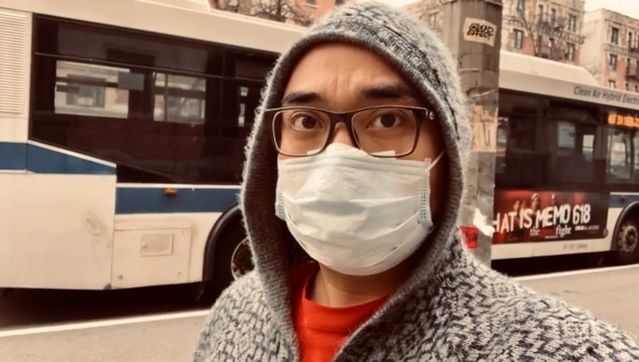
Fast forward to mid-April, when I read an article about how – as badly as New York City has been hit by COVID-19 – it is Queens borough that seems to be the epicenter of the virus in the city. Again, as a scholar focusing on Filipino American psychology, I immediately thought about the large numbers of Filipinos in the city, particularly in Queens as it is home to the largest Filipino concentration in New York. And again, on a more personal level, approximately 80% of my family live in Queens, so the news brought up additional worry for me.
In between these two moments, perhaps just like most people over the past month, my daily life has been dominated by COVID-19. I’ve heard stories of Asian Americans – including some Filipinos – who experienced COVID-related racism. I’ve seen news articles of Filipino Americans dying of COVID-19. On a personal level, some of my Filipino American friends and relatives have been infected by the disease, and I know of Filipino American families who have lost loved ones due to COVID-19. Perhaps just like many other folks, I have been a bit more distressed and anxious – maybe even depressed – over the past month.
So personally, the COVID-19 pandemic has definitely impacted me. But as a scholar, I wondered if it has been broadly impacting the Filipino American community and, if so, how? To begin to answer these questions, or to even begin to generate some hypotheses about them, I need more than personal experiences and anecdotal information. I need data.
Race or ethnicity data in relation to COVID-19, however, is very limited. Even further, the few that are available rarely include Filipino-specific data. Thus, there are many things about how COVID-19 may be affecting various communities – let alone the Filipino American community – that cannot be definitively answered right now. Nevertheless, although data is severely limited, I decided to piece together some of the few relevant information (plus some that I quickly gathered myself) we do have to give us a slightly better picture – better-informed hypotheses, if you may – of how the COVID-19 pandemic might be affecting the Filipino American community. Perhaps future research and improved data collection can test and better answer these hypotheses.
Hypothesis 1: Filipino Americans are likely overrepresented in the frontlines and might be at higher risk for contracting COVID-19
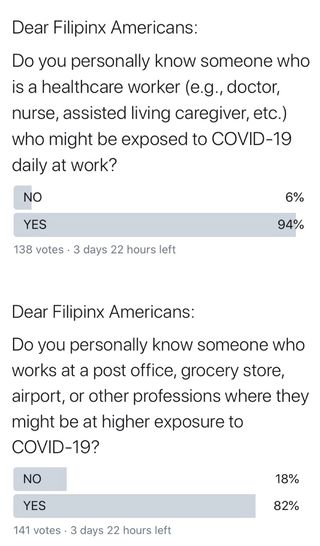
This is probably the easiest hypothesis in this list, as data seems to clearly suggest that Filipinos are likely overrepresented among health care workers who are in the frontlines against COVID-19. For example, although only 4% of California’s population are Filipinos, 20% of nurses in the state are Filipinos. This overrepresentation is true nationally as well, as 4% of nurses in the United States are Filipinos although Filipinos compose only 1% of the country’s population. Furthermore, in New York City, 30% of the Filipino American population there are nurses or other healthcare workers. Consistent with these data, a quick online poll I conducted with 138 Filipino Americans shows that approximately 94% “personally know someone who is a healthcare worker (e.g., doctor, nurse, assisted living caregiver, etc.) who might be exposed to COVID-19 daily at work”.
Data also shows that Filipinos are less likely to have a professional job than whites, and that Filipinos also don’t have a better chance of having professional or managerial jobs than Black workers. Thus, many Filipino Americans do not have the privilege of staying home or working from home during this pandemic. Instead, many Filipinos work in airports, post offices, and grocery stores - putting them in higher likelihood of COVID-19 exposure. Consistent with this, a quick online poll I conducted with 141 Filipino Americans shows that approximately 82% “personally know someone who works at a post office, grocery store, airport, or other professions where they might be at higher exposure to COVID-19”. Thus, because of their jobs, many Filipino Americans continue to be exposed to COVID-19 and might be at higher risk for contracting the disease.
Hypothesis 2: Filipino Americans are very concerned about the community health impacts of COVID-19
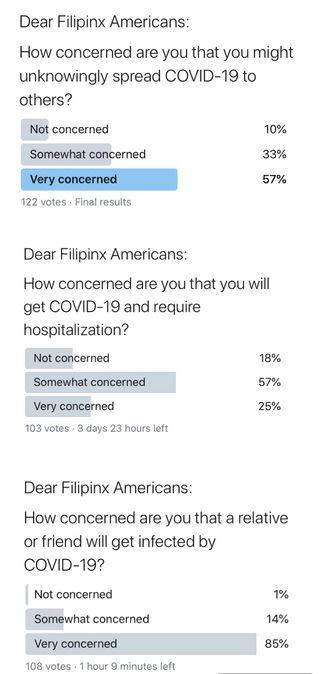
The Pew Research Center released a report showing that Black (31%) and Hispanic (43%) folks are more likely to be very concerned about contracting the disease and getting hospitalized than White folks (18%). The report also showed that Black (38%) and Hispanic (49%) folks are more likely to be very concerned about unknowingly spreading the disease than White folks (28%). It is unfortunate that no Filipino-specific data was available, but a quick online poll I conducted with 103 Filipino Americans shows that approximately 25% were very concerned that they “will get COVID-19 and require hospitalization” - a percentage higher than those for White folks. The same online poll with 122 Filipino Americans shows that approximately 57% are very concerned that they “might unknowingly spread COVID-19 to others”, a percentage that is higher than those for Black people, Hispanic people, and White people.
Furthermore, the online poll also shows that approximately 85% of 108 Filipino Americans are very concerned that “that a relative or friend will get infected by COVID-19”. Putting everything together, although many Filipino Americans are very concerned that they themselves might get COVID-19, they seem to be more concerned about the people around them – especially family and friends – being infected with the disease. Given that Filipinos tend to be more collectivistic (i.e., concerned about others more than themselves), combined with the likelihood that many Filipino Americans have loved ones who are in the frontlines against COVID-19 (see Hypothesis 1), these concerns are not surprising.
Hypothesis 3: Filipino Americans might be at higher risk for developing severe COVID-19 illnesses
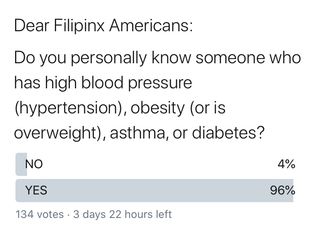
Data shows that more Filipino Americans are in “poor health” than White folks. More specifically, research shows that Filipino Americans are three times more likely to be obese or overweight than White folks. Filipino Americans are also two times more likely to have high blood pressure (hypertension) than White folks, and hypertension increases the likelihood of heart disease. The same research shows that Filipino Americans are three times more likely to have diabetes than White folks, and are more likely to have asthma than White folks. Consistent with these data, a quick online poll of 134 Filipino Americans found that approximately 96% “personally know someone who has high blood pressure (hypertension), obesity (or is overweight), asthma, or diabetes”.
The significance of these health disparities is that all of these conditions are risk-factors for more severe COVID-19 illness. The likelihood that COVID-19 cases are more likely to be severe among Filipino Americans, combined with the likelihood that Filipino Americans are at heightened exposure to COVID-19 (see Hypothesis 1), makes it understandable why so many Filipino Americans seem to be very concerned about their loved ones contracting the disease (see Hypothesis 2).
Hypothesis 4: Filipino Americans are likely distressed or grieving due to COVID-19
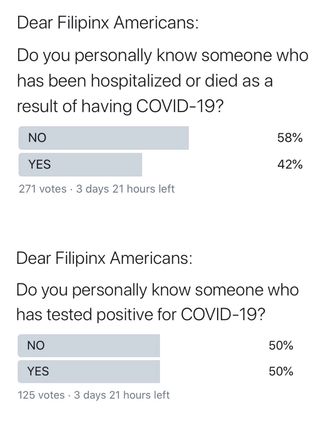
The Pew Research Center released survey results showing that Black people (27%) are more likely than Hispanic (13%) and White (13%) folks to know someone who has been hospitalized or died as a result of having COVID-19. Knowing someone who has been seriously affected by the virus can be psychologically distressing, and may lead to bouts of anxiety, depression, and trauma. It is unfortunate that the Pew survey did not have Filipino-specific data, but a quick online poll I conducted with 271 Filipino Americans shows that approximately 42% “personally know someone who has been hospitalized or died as a result of having COVID-19,” a percentage that is significantly higher than those for Black, Hispanic, or White folks. The same online poll with 125 Filipino Americans shows that approximately 50% - that’s 1 out of 2 – “personally know someone who has tested positive for COVID-19”. Combined with the possibility that Filipino Americans might be at higher risk for developing severe illness due to COVID-19 (see Hypothesis 3), it is possible that many Filipino Americans might be experiencing heightened levels of psychological distress as a result of having the life of someone they care about be seriously threatened by – or be taken by – the disease.
Hypothesis 5: Filipino Americans’ experience of COVID-related racism might be complicated by phenotype
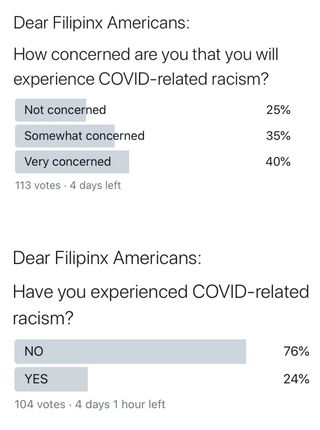
There’s been plenty of attention on anti-Asian racism lately due to COVID-19. Data shows, however, that although COVID-related racism is on the rise among many Asian Americans, the majority of such experiences have been reported by East Asians (65%). Out of over 1100 reported COVID-related racism experiences, only 7% were by Filipino Americans. Such a low percentage of reports, however, does not mean that Filipino Americans experience COVID-related racism less than other forms of racism. A quick online poll with 104 Filipino Americans shows that approximately 24% - that’s 1 out of 4 – have “experienced COVID-related racism”. Research conducted by AAPI Data shows that Filipino Americans report similarly high prevalence of other forms of racism such as receiving poorer service than other people at restaurants or stores (27%), being unfairly denied a promotion (19%), people assuming they are not a creative thinker (20%), being called names or insulted (21%), people assuming they do not speak English (36%), and being unfairly denied a promotion (19%). Given that COVID-related racism seems to happen with similar frequency as other common types of racism that Filipino Americans face, it is not surprising that the online poll found that around 40% were very concerned they will “experience COVID-related racism”.
It is important to note, however, that the online poll also shows that a majority of Filipino Americans (75%) have not experienced COVID-related racism and that 1 out of 4 Filipino Americans are not concerned about COVID-related racism at all (with an additional 35% who are just "somewhat concerned"). The literature on racial phenotypicality bias suggest that people with physical features that are typical of their racial group tend to be treated more negatively. To this, data suggests that Filipinos are not perceived as typically Asian as East Asians. Even further, literature also suggest that Filipinos tend to confuse people – often being perceived as Latinx, for example – because Filipino phenotype, history, and culture “break the rules of race.” Due to these factors, it is possible that COVID-related racism may not be as much of a concern for Filipino Americans as it is for East Asians. Future research may explore such possibilities.
Conclusion
We are still in the midst of struggling through the COVID-19 pandemic. There are many things about COVID-19 that is still unknown, and many of its various effects on various communities cannot be definitively answered right now. As little as we know about the pandemic’s effect on specific communities, we know even less about how it affects the Filipino American community – a relatively understudied and underserved group. The possibilities presented here are guided by the very limited information we have and, thus, must be further scrutinized. Future research and improved data collection with the Filipino American community are needed to test and address these hypotheses.




